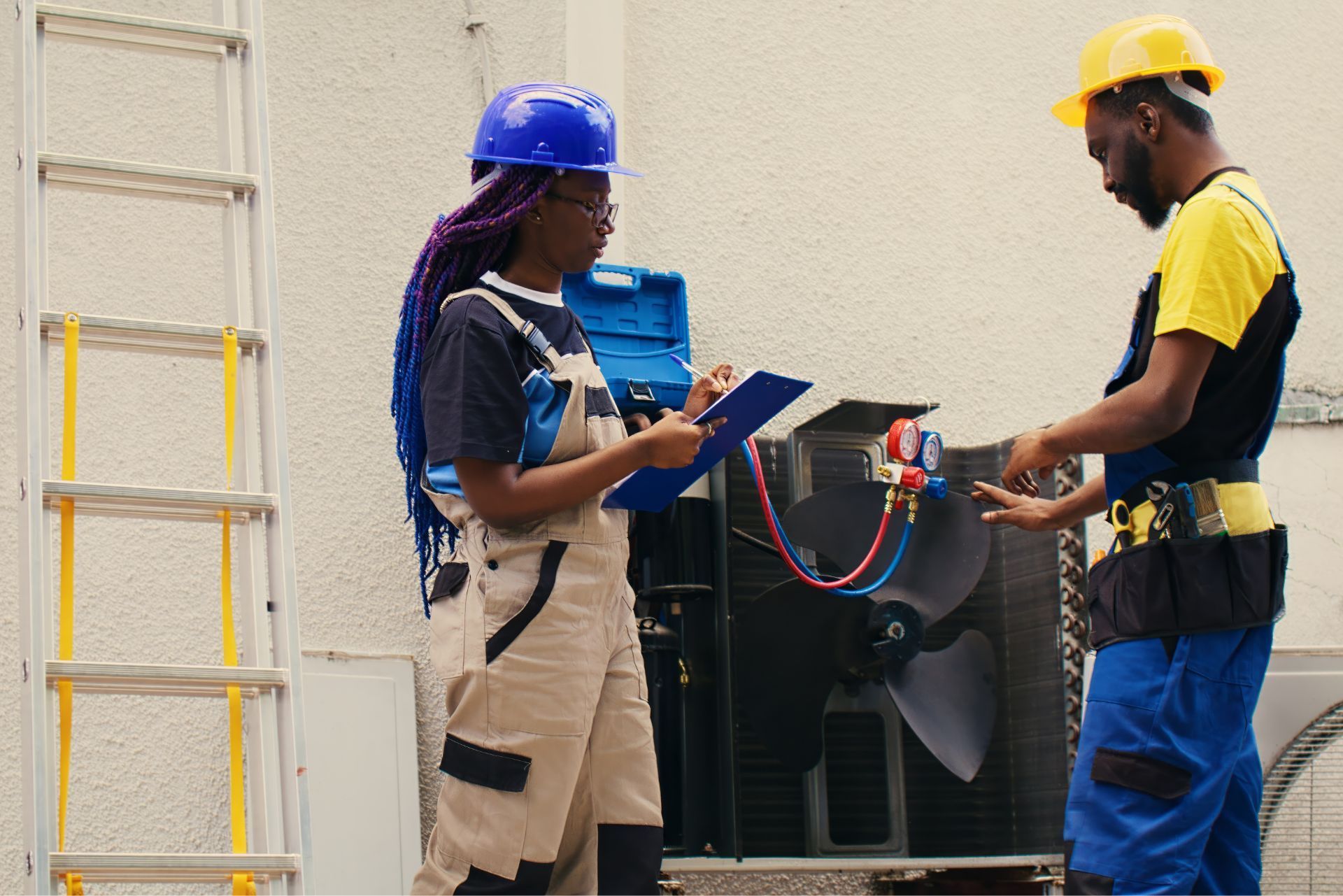Top 3 Recommended Policies

West Virginia’s HVAC contractors work in a demanding market shaped by rugged terrain, seasonal temperature swings, and growing demand for reliable service. From installing heating systems in mountain communities to managing repairs in urban areas, contractors face a range of risks that can impact safety and profitability. Having the right insurance coverage in place is essential to protect your business, your employees, and your customers. This guide explains how HVAC contractor insurance in West Virginia works, including key coverage types, average premium costs, and current market trends. By understanding your options and staying compliant with state regulations, you can safeguard your operations and build long-term trust with clients across the state.
Why HVAC Contractor Insurance is Vital in West Virginia
Contractors insurance in West Virginia serves as a vital shield for businesses operating in the construction and HVAC industries. The state’s specific market dynamics and regulatory environment make it imperative for HVAC contractors to carry comprehensive insurance coverage. Without it, businesses risk severe financial setbacks from lawsuits, property damage, or workplace injuries.
Insurance policies tailored for HVAC contractors typically cover general liability, workers’ compensation, commercial auto, and equipment protection. These coverages collectively reduce the risk exposure associated with HVAC installation, maintenance, and repair work. According to kirtleyinsurance.com, contractors insurance in West Virginia is a crucial investment that safeguards business continuity and client trust.
Protecting Against Specialized Risks
HVAC work involves handling complex systems that can pose risks such as electrical hazards, refrigerant leaks, and structural damage during installation. Liability insurance premiums for HVAC contractors reflect these specialized risks, typically ranging from 1.3% to 2.6% of annual gross revenue. This range underscores the importance of adequate coverage to mitigate potential claims related to property damage or bodily injury.
For example, a small HVAC operation earning around $150,000 annually might expect to pay an average premium of approximately $3,140. This investment can save contractors from devastating out-of-pocket expenses if an accident occurs on the job. Furthermore, having insurance can enhance a contractor's reputation, as clients often prefer to work with insured professionals who demonstrate responsibility and reliability. In a competitive market like West Virginia, this can be a significant differentiator that leads to increased business opportunities.
Additionally, HVAC contractors must navigate the complexities of state regulations, which can vary significantly from one municipality to another. For instance, some areas may have stricter codes regarding the handling of refrigerants, while others might impose specific safety standards for installation practices. Having comprehensive insurance not only helps contractors comply with these regulations but also provides them with the necessary legal support in case of disputes or inspections. This proactive approach to risk management can ultimately lead to smoother operations and a more sustainable business model in the long run.

Understanding the Types of Insurance HVAC Contractors Need
HVAC contractors require a combination of insurance policies to cover the diverse risks they face. These policies not only protect the business but also meet contractual and legal requirements in West Virginia.
General Liability Insurance
This is the cornerstone of HVAC contractor insurance. It covers third-party claims for bodily injury, property damage, and personal injury that occur during business operations. Whether a client’s property is accidentally damaged or a visitor is injured on-site, general liability insurance helps cover legal fees and settlements.
Given the hands-on nature of HVAC work, general liability is indispensable. The premiums, as noted earlier, typically fall between 1.3% and 2.6% of gross revenue, reflecting the risks involved in the trade. Additionally, many clients require proof of general liability insurance before hiring a contractor, making it not just a safety net but a crucial element for securing contracts and building trust with potential customers.
Workers’ Compensation Insurance
Workplace injuries are a significant risk in the HVAC industry due to the physical and technical demands of the job. Workers’ compensation insurance provides wage replacement and medical benefits to employees injured on the job, while protecting employers from lawsuits related to workplace accidents.
In West Virginia, this insurance is mandatory for most businesses with employees, making it a non-negotiable part of contractor insurance portfolios. Moreover, having robust workers’ compensation coverage can enhance employee morale and retention, as workers feel more secure knowing they are protected in case of an accident. This not only fosters a safer working environment but also promotes a culture of accountability and care within the organization.
Commercial Auto Insurance
Many HVAC contractors rely on vehicles to transport tools, equipment, and personnel to job sites. Commercial auto insurance covers accidents involving company vehicles, protecting the business from liability and repair costs.
Since HVAC contractors often drive multiple vehicles, including trucks and vans, having appropriate commercial auto coverage is essential to avoid financial exposure from traffic accidents. Additionally, this type of insurance can cover incidents such as theft of tools from vehicles or damage incurred while transporting heavy equipment, which can be particularly costly. By investing in comprehensive commercial auto insurance, contractors can ensure that their operations remain uninterrupted, even in the face of unforeseen incidents on the road.
Equipment and Tool Insurance
HVAC contractors invest heavily in specialized tools and equipment that are vital to their work. Equipment insurance protects against theft, loss, or damage to these assets, ensuring that operations can continue smoothly even after unexpected incidents.
Beyond just protecting against theft or accidental damage, equipment and tool insurance can also cover the costs associated with rental equipment while repairs are made, minimizing downtime and allowing contractors to meet project deadlines. Given the high cost of HVAC machinery and tools, this insurance is not just a safeguard but a strategic investment that can save contractors from significant financial setbacks, allowing them to focus on delivering quality service to their clients without the looming worry of equipment loss.
Current Market Trends and Their Impact on HVAC Insurance
The Heating & Air-Conditioning Contractors industry in West Virginia is currently experiencing a decline, with an annualized rate expected to reduce the market size to $254.2 million over the five years leading to 2024. This contraction affects contractor revenues and, by extension, insurance premium calculations.
Smaller revenues can lead to lower insurance premiums, but they also mean tighter budgets for coverage. Contractors must balance the need for comprehensive insurance with cost management strategies. As the market shrinks, many contractors may find themselves competing for a smaller pool of clients, which can further strain their financial resources. This competitive pressure can lead to a focus on cost-cutting measures, including reducing insurance coverage, which might expose them to greater risks in the long run.
Despite the industry downturn, the importance of maintaining adequate insurance remains unchanged. In fact, during challenging economic periods, insurance can provide critical protection against unexpected liabilities that could otherwise jeopardize business survival. For instance, a single liability claim or equipment failure could result in significant financial losses, making it essential for contractors to have robust coverage in place. Additionally, as the industry evolves with new technologies and practices, staying insured against emerging risks becomes increasingly vital.
For more details on industry trends, IBISWorld’s report on West Virginia HVAC contractors offers an in-depth analysis.
Adapting Insurance Coverage to Market Conditions
Contractors should regularly review their insurance policies to ensure they align with current business volumes and risk profiles. Adjusting coverage limits and deductibles can help manage premium costs without compromising protection. This proactive approach not only safeguards their operations but also enhances their credibility with clients, as having adequate insurance can be a deciding factor for customers when choosing a contractor.
Working with knowledgeable insurance providers who understand the West Virginia HVAC market can help contractors find tailored solutions that fit both their operational needs and financial constraints. These specialized agents can offer insights into unique risks associated with HVAC work, such as equipment breakdowns, environmental regulations, and workplace safety issues. Moreover, they can assist in navigating the complexities of claims processes, ensuring that contractors are well-prepared to handle any incidents that may arise, thereby minimizing disruptions to their business operations.

Insurance premiums for HVAC contractors are influenced by several factors, including annual gross revenue, claims history, business size, and the types of services offered. As mentioned, premiums generally range from 1.3% to 2.6% of gross revenue, reflecting the specialized risks in HVAC work. These risks can include equipment failure, workplace accidents, and liability claims, all of which can significantly impact the cost of insurance. Understanding these factors can help contractors make informed decisions about their insurance needs and financial planning.
For smaller operations earning around $150,000 annually, average premiums hover near $3,140. Larger businesses with higher revenues will see proportionally higher premiums, but may also benefit from economies of scale and risk management programs. It's important to note that while larger companies may pay more in absolute terms, they often have access to more comprehensive coverage options and risk mitigation resources, allowing them to manage their insurance costs more effectively over time.
Risk Management and Its Role in Premium Reduction
Implementing robust safety protocols and employee training can reduce the likelihood of accidents, which in turn can lower insurance premiums. Insurers often reward contractors with good claims histories and proactive risk management strategies through premium discounts. This can include regular safety audits, employee certifications, and ongoing education about best practices in the HVAC field. By fostering a culture of safety, contractors not only protect their employees but also enhance their reputation in the industry, which can lead to more business opportunities.
Investing in quality equipment and maintaining vehicles properly are additional ways to minimize risks and demonstrate responsibility to insurers. Regular maintenance checks and adherence to manufacturer guidelines can prevent costly breakdowns and accidents. Furthermore, utilizing technology such as GPS tracking and telematics can help monitor vehicle usage and driver behavior, providing additional data that can be leveraged for lower premiums. By taking these proactive steps, HVAC contractors can create a safer work environment while also optimizing their insurance costs.
Choosing the Right Insurance Provider
Selecting an insurance company with expertise in the HVAC industry and familiarity with West Virginia’s regulatory environment is crucial. Providers like those highlighted by Kirtley Insurance specialize in contractor insurance and can offer tailored advice and competitive rates. An experienced provider will understand the unique challenges faced by HVAC contractors, including seasonal fluctuations in demand and the specific liabilities associated with installation and repair work.
Contractors should compare quotes, coverage options, and customer service reputations before committing to a policy. It's also beneficial to seek out reviews and testimonials from other HVAC professionals to gauge the reliability and responsiveness of potential insurers. Engaging in discussions with peers and industry associations can provide valuable insights into which providers offer the best support and coverage for HVAC contractors, ensuring that businesses are adequately protected against unforeseen events.
Steps to Secure HVAC Contractor Insurance in West Virginia
Securing the right insurance coverage involves several key steps that ensure contractors are adequately protected without overpaying.
Assess Your Business Risks
Begin by evaluating the specific risks associated with your HVAC services, including the types of projects handled, employee roles, and equipment used. This assessment helps determine the necessary coverage types and limits. For instance, if your business frequently works on large commercial installations, you may face higher liability risks compared to residential projects. Additionally, consider the geographical area in which you operate, as certain regions may have unique environmental factors that could impact your business, such as extreme weather conditions that might lead to increased claims.
Gather Financial Information
Insurance providers will require details about your business’s annual gross revenue, payroll, and claims history. Accurate financial data ensures that premiums are calculated fairly and coverage is appropriate. It's also beneficial to maintain a clean claims history, as this can lead to lower premiums. If your business has had past claims, be prepared to discuss the circumstances and how you've implemented changes to mitigate future risks. This proactive approach can demonstrate to insurers that you are committed to risk management.
Request Multiple Quotes
Obtain insurance quotes from several providers to compare costs and coverage. Look for policies that offer comprehensive protection while fitting your budget. When requesting quotes, consider asking for details about any available discounts for bundling policies or for maintaining a good safety record. Each insurance company may have different underwriting criteria, so it’s crucial to present your business in the best light possible to secure the most favorable terms. Additionally, don’t hesitate to ask about the insurer’s reputation and claims process, as these factors can significantly impact your experience in the event of a claim.
Review Policy Details Thoroughly
Understand the terms, exclusions, and deductibles of each policy. Pay attention to coverage limits and any additional endorsements that may be necessary for your specific operations. For example, if you use specialized equipment or handle hazardous materials, you might need specific endorsements to ensure those aspects of your business are covered. It’s also wise to consult with an insurance broker who specializes in contractor insurance, as they can help clarify complex terms and suggest the best options tailored to your needs.
Maintain Ongoing Communication with Your Insurer
Keep your insurance provider informed about changes in your business, such as new services, equipment purchases, or employee additions. Regular communication helps keep your coverage current and effective. Additionally, consider scheduling annual reviews of your policy to ensure it evolves with your business. This proactive approach can help identify any gaps in coverage and allow you to adjust your policy as your business grows or changes. Furthermore, staying engaged with your insurer can also provide opportunities to learn about new products or services that may enhance your coverage or reduce your premiums.
Conclusion: Protecting Your HVAC Business in West Virginia
For HVAC contractors in West Virginia, insurance is more than just a regulatory requirement—it is a strategic asset that protects the business from financial risks and supports long-term success. With the industry facing a decline in market size, managing insurance costs while maintaining adequate coverage is more important than ever.
By understanding the types of insurance needed, how premiums are calculated, and the current market landscape, contractors can make informed decisions that safeguard their operations. Partnering with experienced insurance providers knowledgeable about West Virginia’s unique environment ensures that HVAC businesses remain resilient and ready to meet future challenges.
For further insights into HVAC liability insurance premiums and their impact,
Contractor Nerd’s detailed analysis is an excellent resource.
Contact Us
HVACInsure is fully licensed and permitted to sell contractor and commercial insurance in West Virginia.
We proudly serve clients throughout West Virginia and maintain partnerships with local West Virginia insurance carriers to ensure HVAC professionals receive compliant, affordable, and comprehensive coverage that meets project and regulatory requirements.
HVACInsure Focuses on West Virginia HVAC Contractor Insurance
Charleston – Huntington – Morgantown – Parkersburg – Wheeling – Weirton – Fairmont – Martinsburg – Beckley – Clarksburg – South Charleston – St. Albans – Vienna – Bluefield – Bridgeport – Nitro – Dunbar – Moundsville – Hurricane – Princeton – Weston – Elkins – Ranson – Oak Hill – Buckhannon
Frequently Asked Question
Common HVAC Contractor Insurance Questions in West Virginia
These FAQs address common contractor questions. As HVACInsure grows, we will update this section with real client experiences and answers.
How does West Virginia's terrain affect my HVAC insurance?
West Virginia's mountains mean long travel times and remote locations. We cover the logistics of serving spread-out communities.
What coverage do I need for West Virginia's coal and energy industry?
West Virginia's energy sector needs HVAC support. We cover industrial facilities, processing plants, and power generation needs.
Do I need special coverage for older building retrofits?
West Virginia has many older buildings. We cover the liability of upgrading HVAC in properties with code and structural challenges.
What about coverage for Charleston and Morgantown commercial work?
West Virginia's cities have commercial markets. We cover the liability exposure and certificate requirements of urban projects.
How do West Virginia's licensing requirements affect my insurance?
West Virginia requires contractor licensing. We ensure your coverage meets state requirements and provide certificates.
Can I get coverage for work across West Virginia's remote areas?
Absolutely. West Virginia is largely rural and mountainous. We structure coverage that addresses travel and remote service challenges.

Still have questions?
Can’t find the answer you’re looking for? Please chat to our friendly team!

About The Author: James Jenkins
I’m James Jenkins, Founder and CEO of HVACInsure. I work with HVAC contractors and related trades to simplify insurance and make coverage easier to understand. Every day, I help business owners secure reliable protection, issue certificates quickly, and stay compliant so their teams can keep working safely and confidently.
Recognized by National HVAC Trade Associations
These trusted organizations set best practices and standards that carriers rely on when underwriting HVAC risks.
Membership signifies adherence to HVAC industry standards and contractor best practices.


